At summit in Tehran with Putin and Erdogan on conflict, Iranian president says US must leave Syria immediately, while Turkish leader calls to prevent ‘bloodbath’ in Idlib
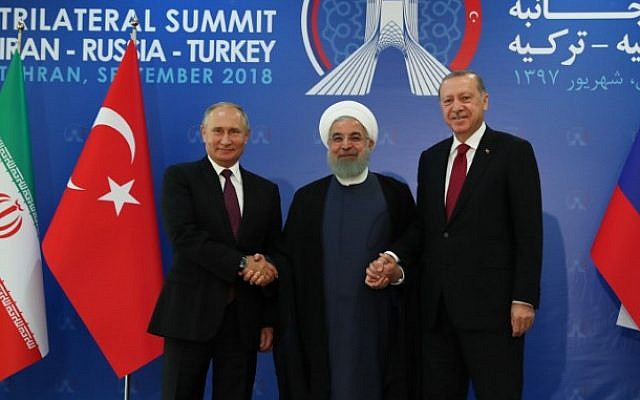
Iranian President Hassan Rouhani on Friday said the US and Israel have realized “they will not reach their objectives” by arming Syria’s rebels, as he met with Russian leader Vladimir Putin and Turkish President Recep Tayyip Erdogan for highly-anticipated talks in Tehran to shape the future of Idlib, Syria’s last major rebel bastion.
On Thursday Foreign Policy claimed that Israel had armed Syrian rebels for years to advance its interests in the war-torn nation.
Rouhani demanded an immediate withdrawal by American forces in the country. The US has some 2,000 troops in Syria. He added that “we have to force the United States to leave,” without elaborating.
“The fires of war and bloodshed in Syria are reaching their end,” Rouhani said, while adding that terrorism must “be uprooted in Syria, particularly in Idlib.”
Rouhani warned against a “scorched earth” policy in Idlib province. “Fighting terrorism in Idlib is an unavoidable part of the mission of restoring peace and stability to Syria,” Rouhani told the summit in Tehran.
“But this battle must not cause civilians to suffer or lead to a scorched earth policy,” he added, amid UN warnings of a humanitarian disaster if an offensive goes ahead.
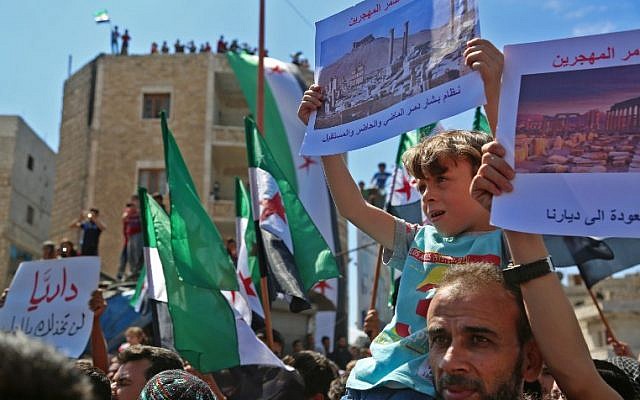
The Turkish leader also urged the Syrian regime and its allies to avoid a bloodbath, but Putin insisted Damascus as “the legitimate Syrian government has a right and must eventually take under control all its national territory.”
The three countries are guarantors of the Astana process, a track of talks on Syria’s civil war launched after Russia’s game-changing 2015 military intervention that has eclipsed Western-backed Geneva negotiations led by the United Nations.
Erdogan called for a ceasefire to prevent any “bloodbath” in Idlib as Russian airplanes pounded rebel positions in the Syrian province.
“If we can ensure a ceasefire here, this will be one of the most important steps of the summit, it will seriously put civilians at ease,” Erdogan said. “We never want Idlib to turn into a bloodbath,” Erdogan said.
“Any attack launched or to be launched on Idlib will result in a disaster, massacre and a very big humanitarian tragedy.”
Iranian and Russian support for Syrian President Bashar Assad has shored up the Damascus regime, allowing it to regain the upper hand in the seven-year civil war which has claimed some 350,000 lives since 2011.
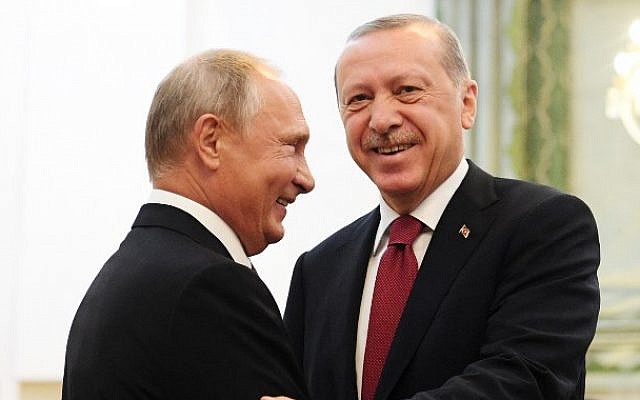
Seized from government forces in 2015, Idlib and adjacent areas form the final major chunk of Syrian territory still under opposition control. It is home to some three million people — around half of them displaced from other parts of the country, according to the United Nations.
Putin said it was “unacceptable” to use civilians as a pretext to shield “terrorists” in Syria’s rebel-held Idlib.
He warned militants in Idlib planned “provocations,” possibly including chemical weapons. The Syrian government has been repeatedly accused of using chemical weapons in the long conflict.
Each of the three nations has its own interests in the yearslong war in Syria.
Iran wants to keep its foothold in the Mediterranean nation neighboring Israel and Lebanon. Turkey, which backed opposition forces against Assad, fears a flood of refugees fleeing a military offensive and destabilizing areas it now holds in Syria. And Russia wants to maintain its regional presence to fill the vacuum left by America’s long uncertainty about what it wants in the conflict.
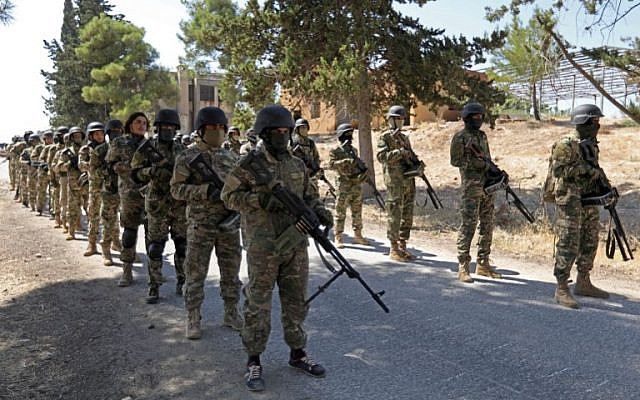
Northwestern Idlib province and surrounding areas are home to about 3 million people — nearly half of them civilians displaced from other parts of Syria. That also includes an estimated 10,000 hard-core fighters, including al-Qaeda-linked militants.
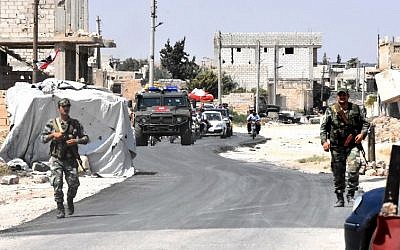
For Russia and Iran, both allies of the Syrian government, retaking Idlib is crucial to complete what they see as a military victory in Syria’s civil war after Syrian troops recaptured nearly all other major towns and cities, largely defeating the rebellion against Assad.
A bloody offensive that creates a massive wave of death and displacement, however, runs counter to their narrative that the situation in Syria is normalizing, and could hurt Russia’s longer-term efforts to encourage the return of refugees and get Western countries to invest in Syria’s postwar reconstruction.
For Turkey, the stakes couldn’t be higher. Turkey already hosts 3.5 million Syrian refugees and has sealed its borders to newcomers. It has also created zones of control in northern Syria and has several hundred troops deployed at 12 observation posts in Idlib. A government assault creates a nightmare scenario of potentially hundreds of thousands of people, including militants, fleeing toward its border and destabilizing towns and cities in northern Syria under its control.
Naji al-Mustafa, a spokesman for the Turkey-backed National Front for Liberation, said Friday his fighters were prepared for a battle that they expect will spark a major humanitarian crisis.
“The least the summit can do is to prevent this military war,” he said.
Early on Friday, a series of airstrikes struck villages in southwest Idlib, targeting insurgent posts and killing a fighter, said Rami Abdurrahman, the head of the Britain-based Syrian Observatory for Human Rights. Abdurrahman said suspected Russian warplanes carried out the attack.
Turkey also doesn’t want to see another Kurdish-controlled area rise along its border, as it already faces in northern Iraq.
As reported by The Times of Israel
